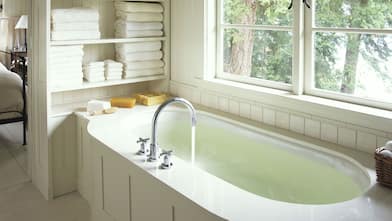Could this call wait until morning or do you need immediate assistance?
When you hear a drip, drip, drip late at night, it’s hard to know if the leak constitutes a plumbing emergency or if the problem can wait until regular business hours. Instinct may have you rushing to the phone in a panic instead of calmly assessing the situation. But let’s keep a level head here, shall we? Here are some quick questions to help you process before dialing up an emergency plumber near you, so you can avoid spending more money than needed and get back to bed.
1. Do You Need to Use the Affected Plumbing Right Away?
A flooding basement obviously warrants an emergency call, but that broken toilet or clogged sink? They could probably wait until morning to schedule a plumbing appointment. In this case, make sure your household knows to avoid using the fixture until further notice (even if it’s a bit inconvenient). Tape a note on the wall, toilet, or faucet, or block off the room entirely to avoid late-night forgetfulness.
2. Can You Turn the Fixture Off?
If you have a minor leak at the sink and can shut off the water to that fixture, then it’s not a plumbing emergency. Look under the sink or behind the toilet for the shut-off valve. You might have to turn off the main water line to the house for bigger issues, though. The main shutoff valve is likely located near the water meter in the lower level of your home on the street side.
If the leak is more like a trickle, you might be able to hold off the leak for a few hours with items like tape, rubber bands, and hardware store solutions.
3. How’s the Weather?
Oddly enough, the weather will factor into whether you need plumbing services ASAP. If it’s the middle of a hot summer day and you don't have access to water, that’s a health concern. If the outside temperature is below 32 degrees Fahrenheit and your water heater is struggling to turn on, call in reinforcements.
4. Will Leaving the Problem Alone Cause More Damage?
You could try using buckets to collect water, stuffing rags in the pipes, and other stopgap measures on a slow leak to carry you through until regular business hours. But when one bucket isn’t enough to last through the night, your leak is more serious. Significant leakage can affect the floor, ceiling, and all adjoining walls in your home. If stopping the flow of water isn’t possible, or the water has the potential to do significant damage quickly, it’s time to pick up the phone.
5. Is It Your Responsibility to Fix the Problem?
In some cases, the emergency may not be something you can fix even if you wanted to. For example, your water company may offer to send a plumber to repair a problem with the sewer main, a blocked sewer, or the main water line. Try them first before calling your own plumber to the scene. City employees might fix issues with city water supplies at no cost to you. City employees might fix issues with city water supplies at no cost to you unless you need to pay for repairs to your main water line near the house.
Examples of Common Plumbing Emergencies
Ruptured pipes: If a pipe is spraying water, turn off the water supply and move furniture and other items out of the affected area.
Water heater leaks or failure: If the tank is dripping, smelly, or making an odd noise, call for help. Water heater failures can cause expensive damage quickly.
Other major leaks: Washing machine hoses, toilet overflows, and even gas line leaks all constitute an emergency call.
Sewer system backups: Oddities such as a bubbling toilet or water appearing in the shower when you flush the toilet are signs of sewer system backups. If the basement smells like rotten eggs, dangerous sewer gases are seeping on from an exposed area.
What Happens When You Call an Emergency Plumber?

Emergency plumbing problems are a stressful event, there’s no way around it. Try to keep calm and mitigate the plumbing emergency. Start by looking for the shut-off valve to the fixture. Then assess the situation and call a professional plumbing service you can trust if needed.
It still pays to shop around for professional plumbing repairs, especially if you don’t already have a plumbing company you trust on call. Calling three companies for an estimate over the phone (if time allows) will help you pinpoint a fair price.
Remember to ask questions, even in an emergency. Before saying yes to emergency service, describe the problem you're having to the company and ask for a ballpark cost estimate. That includes the regular cost of the service plus any extra fees incurred for a night or weekend housecall. Know that the cost might increase once your contractor sees the extent of the plumbing issue.
How Much Does an Emergency Plumber Cost?
Expect to pay at least time and a half for a late-night, weekend, or holiday plumbing repair. Companies might charge a flat fee of $100 to $350 for emergency visits, according to HomeAdvisor. This could be in addition to a higher hourly rate, usually $70 to $400.
Additionally, the plumbing pro might get the situation under control in the off-hours and then come back with specific parts later. For that, you might be billed an additional visit plus the regular hourly rate. Be sure to ask for these specifics when choosing a contractor.





